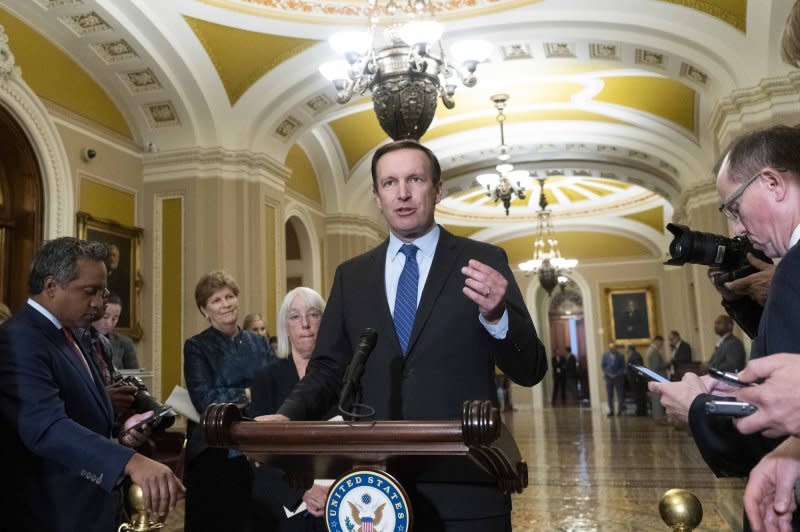Senators say Biden needs congressional approval for Houthi strikes

Jan. 24 (UPI) -- A bipartisan group of U.S. Senators questioned the Biden Administration's strategy on Houthi Red Sea attacks as the U.S. struck Houthis again Wednesday.
Sens. Tim Kaine, D-Va., Todd Young, R-Ind., Chris Murphy, D-Conn., and Mike Lee, R-Utah, said in a statement that while they condemn the Houthi attacks on shipping they believe Congress must carefully deliberate before authorizing offensive military action.
"We strongly condemn the repeated Houthi attacks against international cargo ships and U.S. military assets protecting those ships in the Red Sea," the senators wrote in a letter to Biden. "These actions also put lives at risk, including those of U.S. service members, and we mourn the loss of two U.S. Navy SEALs who tragically died while combating these threats
The senators said for sustained strikes Biden needs congressional approval.
"American participation in another war in the Middle East cannot happen in the absence of authorization by Congress, " the senators said.

Responding to the senators' concerns, President Joe Biden on Wednesday said the Houthis pose a continued threat against the U.S. military and commercial maritime traffic in the region and the military actions against them are allowed by the War Powers Resolution of 1973.
"Yemen‑based Houthi militants have engaged in a series of attacks against United States military forces, including ships and aircraft, and against maritime commercial shipping, operating in the Red Sea, the Bab al-Mandeb Strait, and the Gulf of Aden," Biden said in a letter to leaders in the House and Senate. "These attacks pose a threat to the safety of United States forces and commercial ships and their crews, regional political and economic stability, and navigational rights and freedoms."

Early Wednesday the U.S. military hit two Houthi anti-ship missiles they said were prepared to launch against shipping in the Red Sea. It was the ninth military strike by American forces against the Houthis.
U.S. Central command said Wednesday the missiles that were hit presented an imminent threat to merchant vessels. Britain has participated in some of the U.S. strikes, backed by other allies, in an effort to deter the Houthis from attacking Red Sea commercial shipping.

In their letter to the Biden administration the senators said most vessels transiting the Red Sea are not U.S. ships. And that, they said, raises questions about the extent to which presidential authorities to use force to defend them can be exercised.
The senators said they agree that Biden does have presidential power under Article II of the U.S. Constitution to defend the U.S. military from attacks.
The senators posed four questions to the administration, including whether Biden believes there is a legal rationale for a president to unilaterally order military action to defend foreign ships and what the Biden administration's understanding of self-defense is in the context of these strikes.
They asked for a written explanation of "the legal authority under which the Administration has carried out each of these strikes and after carrying out any strikes against Houthi targets that occur after receipt of this letter, including any pre-emptive strikes."
The senators also asked the date that U.S forces were "introduced into hostilities" in Yemen and the Red Sea.
The Houthis have attacked at least 33 ships since Nov. 19, according to U.S. officials. They say they are attacking shipping in response to Israel's war on Hamas in Gaza. Israel invaded Gaza after Hamas killed approximately 1200 Israelis, most of them civilians.
Last year the U.S. Senate passed Kaine and Young's bipartisan legislation reasserting congressional war powers while repealing Gulf and Iraq war authorizations.

 Yahoo News
Yahoo News 
